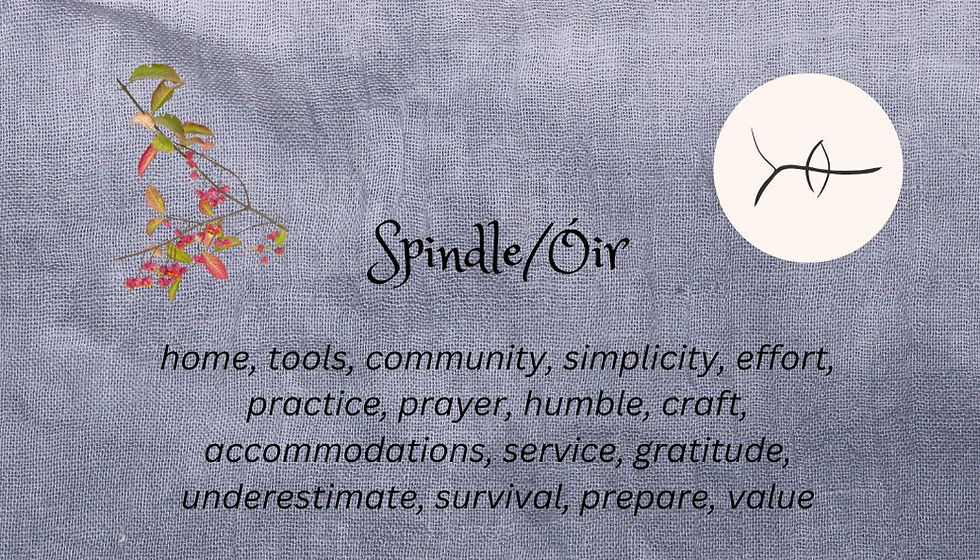AMA - An Interview with Beth Buchanan
- ncbeaton
- Nov 19, 2023
- 4 min read

As publishers, it’s a special joy to get to know our creators, and we hope you’re curious about getting to know them too! With The Oak King: A Yule Story coming out this week, we interviewed Beth Buchanan, author of the books in the Wheel of the Year series of high holiday stories for pagan kids and families.
Nine Fires: Beth, how do you envision these stories being shared? Like, who is reading it to whom, where, when? Beth Buchanan: What I wanted out of this series is stories for pagan kids to read and for pagan families to share around their holidays. The dominant paradigm has tables and tables of books and stories centered on Christian and Christian-adjacent stories. Representation matters, and I wanted books pagan kids could grow up with that represent their faith life.
I would love to think of high holidays rolling around and families sitting down together–whether in their own homes or at whatever rituals they celebrate–and reading the stories. Folktales and fairy tales teach customs, traditions, and beliefs as well or better than anything.
9F: Does somebody need to know a lot of mythology or other religions to enjoy The Oak King?
BB: Oh, I hope not! I want these stories to stand alone as stories, first and foremost. I also hope they share and teach about our mythologies and religious traditions, as well as reflect readers’ lived experiences back to them. It might be true that readers with extensive prior knowledge of mythology and religions will experience the books differently, but I don’t think it’s necessary to anyone’s enjoying them.
9F: What different cultures are explored in the Wheel of the Year series?
BB: What a great question! I’m a Gaelic Polytheist, so the deities and mythologies I center in my own worship and practice are Gaelic, or at the very least, pan-Celtic. Gaelic culture is also my own heritage and genetic make-up. The stories in my series center on those cultures because these are, in a real sense, my stories to tell. For that reason, you’ll see settings (loosely) based on Scottish, Irish, Welsh, and even ancient British societies in these eight stories. Those are the cultures out of which, for the most part, Wiccan, neo-Druidic, and other “Celtic” earth-based spiritualities grew. So that’s what I write.
That’s not to say that no people of color existed in the cultures upon which I’ve based my settings. People traveled back then, after all. What I will emphatically state, however, is that this old white lady has no business telling the stories of black and brown people or of any indigenous people (or as close to it as we can get) beyond the British Isles. Those are important stories that should absolutely be told, but by others telling about their gods, their cultures, their languages, and their faiths. And I hope they will write them!
9F: Here’s a fun one. What was the first thing you ever wrote?
BB: Assuming you mean fiction, it was a short ghost story assignment I wrote in 7th grade, back in 1972. My teacher, Mrs. Lynch, put an overhead transparency up on the screen (high tech!) as a writing prompt. It was an illustration of two boys about to open the door of what was apparently a haunted house.
My story was something along the lines of how the ghost in the house had been cursed, and now that some living people had entered the house, the curse was lifted on him and transferred to the first boy who crossed the threshold. That boy was killed in the house and became the house’s new ghost. The other boy lived to tell the tale and was revealed to be the narrator at the end. I wish I still had a copy of it!
9F: Last question. How do you think present-day readers see themselves in these characters?
BB: I do hope the main characters, or even minor characters, are relatable to readers. Their problems and cares are universal in many respects. In some of the stories, the characters are average humans interacting with each other and with deities, entities, and magics that are beyond them in what I hope are familiar and meaningful ways to pagan kids. The Oak King, however, is different.
In this story, we have two archetypes in a cosmic struggle, but the tale does answer questions younger kids might ask. It’s an age-old trope that myths and legends often reflect human’s struggles to understand their world and to answer questions they don’t have the science for. In this case, of course, it’s why winter gives way to spring each year. The popular story of the Oak and Holly Kings is not attested to in any lore, but it has become commonly heard in pagan circles. That’s why I wanted to write a version of my own.
9F: Thanks, Beth! It was good to chat with you during Nine Fires’ very first Ask Me Anything. Remember, the second book in the Wheel of the Year series, The Oak King: A Yule Story, comes out November 21, so you can snag your copy in time for the Yule holiday.
A Garland of Flowers: A Beltane Story was released early this year and spent some time on Amazon as a #1 New Release. We can’t wait to hear how families and young readers enjoy this new release too!







Comments